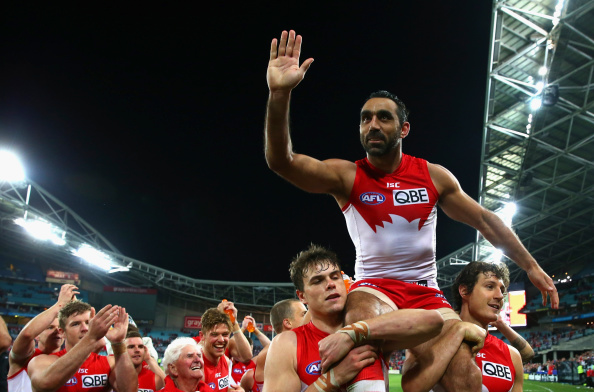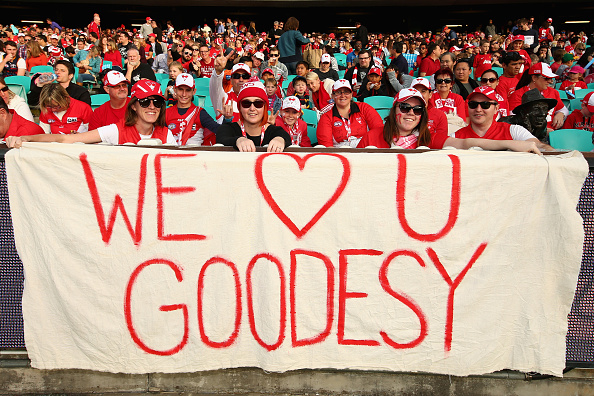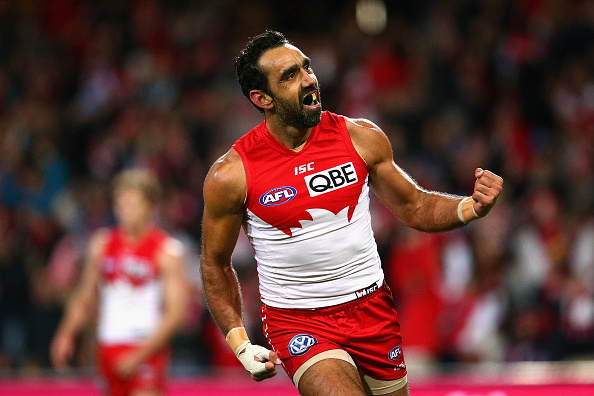It’s rare to see media outlets agree, and it’s rare to see them take an outright stand in support of an individual player in the middle of a controversy, but that’s what’s currently happening in Australia.
That would be the ongoing controversy over the continuous booing of Australian Football League legend Adam Goodes of the Sydney Swans, which many argue is rooted in racism against aboriginal Australians. The constant booing of Goodes has been so bad that he sat out Sydney’s victory against Adelaide this weekend and is reportedly contemplating retirement.
The developing story has led to a media phenomenon we rarely see. Prominent newspapers and other media outlets from different parts of the country, including The Age, The Sydney Morning Herald and The Daily Advertiser have thrown their support fully behind Goodes, with the first two launching a joint campaign with Saturday edition wrap posters to promote the #istandwithadam hashtag. Why has this story led to media taking such a strong stand on a issue many see as divisive, and could we ever see something similar in North American sports?
From the outside, it seems we’re seeing this media stand now thanks largely to two factors: the reputation of the player involved, which is remarkable, and the nature of this story, which goes well beyond sport and has much broader implications for Australia. Those who don’t follow the AFL regularly probably haven’t heard of Goodes, but inside the sport, he’s a comparable figure to the likes of Peyton Manning or Tom Brady. He’s twice won the Brownlow Medal (the AFL equivalent of MVP, awarded annually to the “fairest and best” player), twice won a premiership with the Swans, and currently sits 9th on the all-time AFL appearances list. Goodes was also named Australian of the Year in 2014 both for his sporting achievements and for his work as an indigenous community leader.

It’s Goodes’ status as an indigenous Australian that is at the center of this controversy, though. It began when a 13-year-old girl called him an ape in 2013 (during the AFL’s Indigenous Round, no less). Goodes pointed her out and had her ejected from the stadium, and while he said not to blame her afterwards and declined to press charges, many have used that as something to get back at him for. The girl’s mother this week blamed Goodes for the booing he’s receiving and said “he should man up and just take it.”
The story’s taken plenty of twists since then, but it particularly intensified this May when Goodes responded to booing from Carlton Blues fans with an indigenous-themed dance that included throwing an imaginary spear. The booing of Goodes has gotten much stronger and much more prevalent since that moment. Things particularly came to a head this week with Goodes taking a leave from the club after last week’s match against the West Coast Eagles in Perth, where he was booed every time he touched the ball. One Eagles fan was even ejected after shouting that Goodes should “get back to his zoo.”
Goodes’ story hass become about much more than just sport; it’s turned into a wider debate about racism in Australia and how their society should address it. That’s what’s particularly sparked this unusual amount of media rallying to his cause, in no uncertain terms. Here’s the key part of the editorial from the Morning Herald:
This is a personal plea from the Herald to every Australian who thinks the controversy over booing Adam Goodes is a media beat-up or just another case of a minority playing the victim; that the Sydney Swans player is being a sook and should be more grateful for the opportunities an Aborigine like him has been given; that this is more political correctness gone mad and just another case, as columnist Andrew Bolt claims, of the “racism industry” running rampant.
Yes, as a footy fan you do have a right to boo players on the field. It’s a tradition to target rivals – usually those who are the most threat to your team getting on top and staying there.
Yes, you have a right to follow others when they boo, too, to magnify the effect and perhaps put the player off his or her game.
You even have a right to be a bigot, according to federal Attorney-General George Brandis last year as he prosecuted the case for more hate speech: “In a free country people do have rights to say things that other people find offensive or insulting or bigoted.”
But first ask yourself these questions in regards to Adam Goodes, a proud Indigenous Australian, unquestionable footballing great, Australian of the Year and most of all a human just like you, your children and your friends.
Am I booing Goodes because I have the right to boo and the right to be a bigot or I am doing it because I am too scared to say no, that this is not the right thing to do; that this is not okay for Australia, that this has gone too far, that this has given ammunition to those who have more sinister motives?
And from The Age:
Today we have taken an unusual step – a call to action in support of Indigenous footballer Adam Goodes and against the racism inherent in the abuse he has suffered from a minority of fans of our national game. Our move reflects profound concern about the treatment that Goodes, who is apparently considering a premature end to his illustrious career, has been receiving from an ignorant, mean-spirited portion of our society.
We take it as self-evident that vilifying any person on the grounds of race is a dreadful and harmful act that not only reflects terribly on the perpetrator, but is corrosive of our very community. The attacks on Goodes in recent times have reached such a level that they are reflecting poorly on our entire nation. We all have a duty to help end this travesty – and prevent repeats – by having the courage and decency to call out such behaviour as a racist disgrace. It certainly has no place in a nation that would pride itself on being diverse, multicultural and, above all, fair.
It’s not just the media doing this, of course, as the AFL captains and AFL CEO Gillon McLachlan have weighed in to support Goodes, as has prime minister Tony Abbott (although some argue he hasn’t gone far enough) and actors like Cate Blanchett and Richard Roxburgh. Of course, it hasn’t been unanimous support for Goodes. The Swans star has been criticized by AFL commentators such as former player Dermott Brereton and blasted by some media pundits (who have in turn been mocked for their takes). However, those voices have been effectively drowned out by the massive outpouring of support for Goodes from inside and outside the AFL.

The degree to which the media, and the Morning Herald and The Age in particular, are going in on this is remarkable, though. It’s something to see them not only make a sports story their lead story, but to take a firm editorial stance on it, and back that up with the unusual step of an edition-wrap poster urging particular action from the public. It’s also something that we haven’t really seen in North American sports.
Yes, we’ve seen moments where numerous American and Canadian media outlets have publicly gotten behind athletes and teams (often around the Olympics or the World Cup; the recent Women’s World Cup’s a good example, especially for U.S. media outlets). Yes, we’ve seen some coverage that could be dubbed advocacy for particularly trail-blazing athletes, especially recently around Caitlyn Jenner, Jason Collins, and Michael Sam. Those stories have been primarily treated as standard news by the majority of outlets (and debate fodder for those particular corners of the American media). And while there’s been plenty of individual opinion pieces written in support of them, it hasn’t really been close to the systematic effort we’re seeing from Australia.
To see a story unfold like this in 2015 is truly stunning, not just because of the appalling nature of the racial vilification facing a legendary athlete for celebrating his indigenous heritage. It’s rare to see so many different entities, with competing agendas most of the time, come together and unite for a common purpose.
If these same events were to happen to an athlete of Goodes’ stature in American sports, it would have a similar effect in going well beyond the sports world and rocking the entire nation. One could make a good case that it would be the biggest sports story in a number of years. It’s rare that an athlete’s story transcends sports, but the support for Adam Goodes is doing just that in Australia. And in those moments, media outlets and everyone else involved has to decide whether it’s more important to be objective or to take a public stand for a worthy cause. From this corner, the actions of The Age and The Morning Herald in particular are laudable; they’re taking a firm stance on something that started as a sporting issue about a particular player, but one that is now much more than that. Sometimes there are stories and moments that are transformational and go outside the traditional lines of sports and media. The support of Adam Goodes as something that could really transform how Australia approaches race and racial issues is one of them.








Comments are closed.